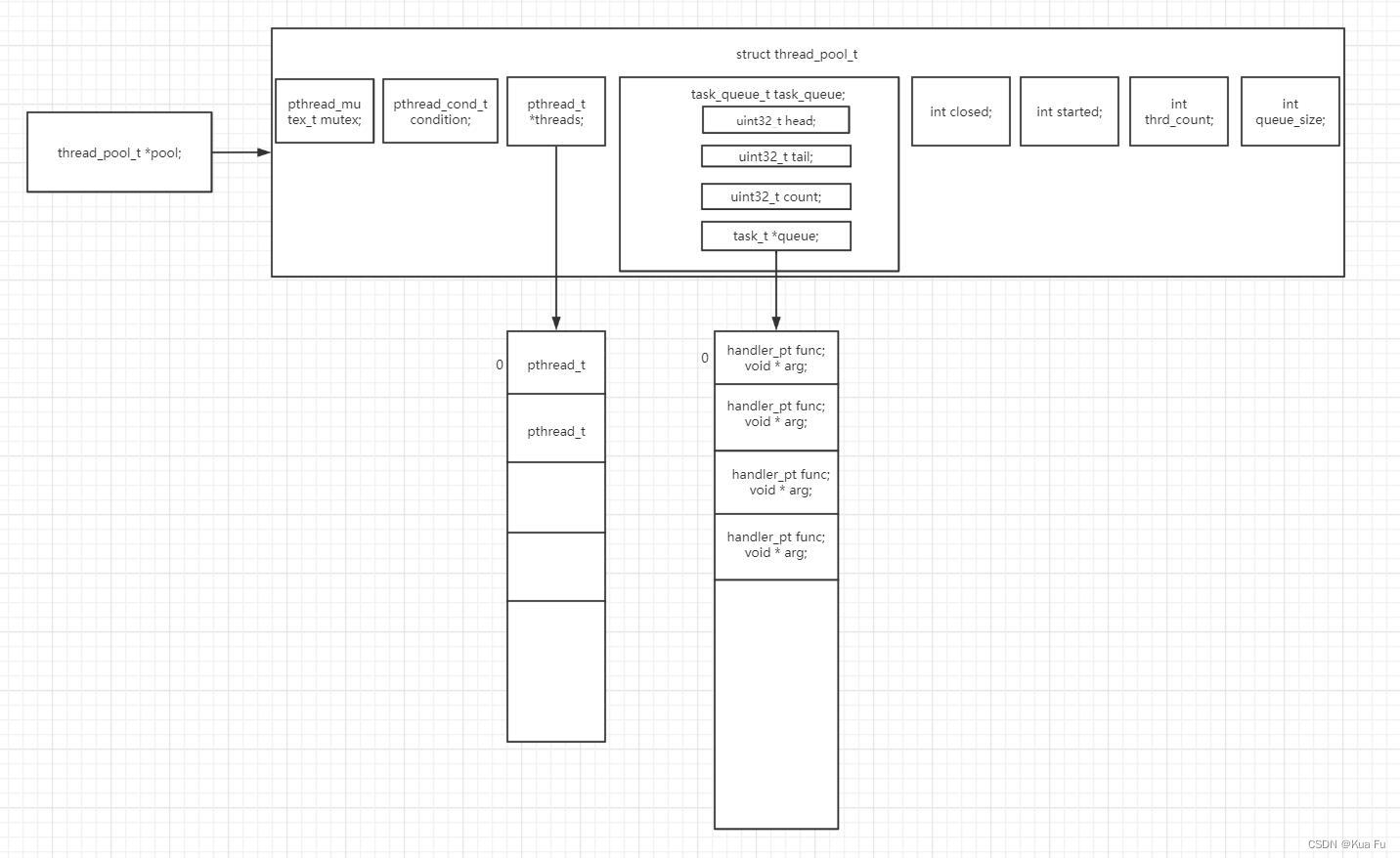一、为什么要线程池?
- 某类任务特别耗时,严重影响该线程处理其他任务。
- 在其它线程异步执行该任务。
- 线程资源的开销与cpu核心之间平衡选择
- 作用
①复用线程资源
②充分利用系统资源
③异步执行耗时任务
二、线程池
- 线程池是一个生产消费模型
- 构成
- 生产者线程 --> 发布任务
- 线程池(消费者)
- 线程
- 取出任务
- 执行任务
- 线程调度
- mutex+condition
- 从无到有
- 从有到无
- 线程
- 队列
- 任务
- 任务的上下文
- 任务执行函数
- 任务
- 平衡选择
- 耗时任务
- io密集
- 2 * n (核心数) + 2
- cpu密集
- 核心数 n
- 确定线程池线程
- (io等待时间 + cpu运算时间)* 核心数 / cpu运算时间
- io密集
- 耗时任务
三、实现一个线程池
- 接口设计
- 创建线程池的接口
- 线程池的数量
- 队列的长度
- 销毁线程池的接口
- 标记线程池退出
- 通知所有线程
- 生产者抛出任务的接口
- 构造任务
- 放入队列
- 通知线程唤醒
- 创建线程池的接口
- 线程池结构体图
- 代码
- main.c
- thrd_pool.c
- thrd_pool.h
线程池结构体图

main.c
#include <stdio.h>
#include <stdlib.h>
#include <pthread.h>
#include <unistd.h>
#include "thrd_pool.h"
int nums = 0;
int done = 0;
pthread_mutex_t lock;
void do_task(void *arg) {
usleep(10000);
pthread_mutex_lock(&lock);
done++;
printf("doing %d task\n", done);
pthread_mutex_unlock(&lock);
}
int main(int argc, char **argv) {
int threads = 8;
int queue_size = 256;
if (argc == 2) {
threads = atoi(argv[1]);
if (threads <= 0) {
printf("threads number error: %d\n", threads);
return 1;
}
} else if (argc > 2) {
threads = atoi(argv[1]);
queue_size = atoi(argv[2]);
if (threads <= 0 || queue_size <= 0) {
printf("threads number or queue size error: %d,%d\n", threads, queue_size);
return 1;
}
}
thread_pool_t *pool = thread_pool_create(threads, queue_size);
if (pool == NULL) {
printf("thread pool create error!\n");
return 1;
}
sleep(100);
while (thread_pool_post(pool, &do_task, NULL) == 0) {
pthread_mutex_lock(&lock);
nums++;
pthread_mutex_unlock(&lock);
}
printf("add %d tasks\n", nums);
wait_all_done(pool);
printf("did %d tasks\n", done);
thread_pool_destroy(pool);
return 0;
}
thrd_pool.h
#ifndef _THREAD_POOL_H
#define _THREAD_POOL_H
typedef struct thread_pool_t thread_pool_t;
typedef void (*handler_pt) (void *);
thread_pool_t *thread_pool_create(int thrd_count, int queue_size);
int thread_pool_post(thread_pool_t *pool, handler_pt func, void *arg);
int thread_pool_destroy(thread_pool_t *pool);
int wait_all_done(thread_pool_t *pool);
#endif
thrd_pool.c
#include <pthread.h>
#include <stdint.h>
#include <stddef.h>
#include <stdlib.h>
#include <unistd.h>
#include <stdio.h>
#include "thrd_pool.h"
typedef struct task_t {
handler_pt func;
void * arg;
} task_t;
typedef struct task_queue_t {
uint32_t head;
uint32_t tail;
uint32_t count;
task_t *queue;
} task_queue_t;
struct thread_pool_t {
pthread_mutex_t mutex;
pthread_cond_t condition;
pthread_t *threads;
task_queue_t task_queue;
int closed; // ???
int started; // 当前运行的线程数
int thrd_count;
int queue_size;
int a;
};
static void * thread_worker(void *thrd_pool);
static void thread_pool_free(thread_pool_t *pool);
thread_pool_t *thread_pool_create(int thrd_count, int queue_size) {
thread_pool_t *pool;
if (thrd_count <= 0 || queue_size <= 0) {
return NULL;
}
pool = (thread_pool_t*) malloc(sizeof(thread_pool_t));
if (pool == NULL) {
return NULL;
}
pool->thrd_count = 0; // 线程创建之前初始化为 0, 当创建成功时更新
pool->queue_size = queue_size;
// 任务加入队列采用尾插法
pool->task_queue.head = 0;
pool->task_queue.tail = 0;
pool->task_queue.count = 0;
pool->started = 0; //
pool->closed = 0;
pool->task_queue.queue = (task_t*)malloc(sizeof(task_t)*queue_size);
if (pool->task_queue.queue == NULL) {
// TODO: free pool
return NULL;
}
pool->threads = (pthread_t*) malloc(sizeof(pthread_t) * thrd_count);
if (pool->threads == NULL) {
// TODO: free pool
return NULL;
}
int i = 0;
for (; i < thrd_count; i++) {
if (pthread_create(&(pool->threads[i]), NULL, thread_worker, (void*)pool) != 0) {
// TODO: free pool
return NULL;
}
pool->thrd_count++; // 记录线程池初始创建时总线程数
pool->started++; // 记录程序运行过程中线程池某时刻存在的线程数
}
// 静态初始化, 不需要销毁
// pool->mutex = PTHREAD_MUTEX_INITIALIZER; // 初始化互斥锁
// pool->condition = PTHREAD_COND_INITIALIZER; // 初始化条件变量
// 动态初始化, 需要销毁
pthread_mutex_init(&(pool->mutex), NULL);
pthread_cond_init(&(pool->condition), NULL);
return pool;
}
int thread_pool_post(thread_pool_t *pool, handler_pt func, void *arg) {
if (pool == NULL || func == NULL) {
return -1;
}
task_queue_t *task_queue = &(pool->task_queue);
if (pthread_mutex_lock(&(pool->mutex)) != 0) {
return -2;
}
if (pool->closed) {
pthread_mutex_unlock(&(pool->mutex));
return -3;
}
if (task_queue->count == pool->queue_size) {
pthread_mutex_unlock(&(pool->mutex));
return -4;
}
task_queue->queue[task_queue->tail].func = func;
task_queue->queue[task_queue->tail].arg = arg;
task_queue->tail = (task_queue->tail + 1) % pool->queue_size;
task_queue->count++;
if (pthread_cond_signal(&(pool->condition)) != 0) {
pthread_mutex_unlock(&(pool->mutex));
return -5;
}
pthread_mutex_unlock(&(pool->mutex));
return 0;
}
static void thread_pool_free(thread_pool_t *pool) {
if (pool == NULL || pool->started > 0) {
return;
}
if (pool->threads) {
free(pool->threads);
pool->threads = NULL;
pthread_mutex_lock(&(pool->mutex));
pthread_mutex_destroy(&pool->mutex);
pthread_cond_destroy(&pool->condition);
}
if (pool->task_queue.queue) {
free(pool->task_queue.queue);
pool->task_queue.queue = NULL;
}
free(pool);
}
int wait_all_done(thread_pool_t *pool) {
int i, ret=0;
for (i=0; i < pool->thrd_count; i++) {
if (pthread_join(pool->threads[i], NULL) != 0) {
ret=1;
}
}
return ret;
}
int thread_pool_destroy(thread_pool_t *pool) {
if (pool == NULL) {
return -1;
}
if (pthread_mutex_lock(&(pool->mutex)) != 0) {
return -2;
}
if (pool->closed) {
thread_pool_free(pool);
return -3;
}
pool->closed = 1;
if (pthread_cond_broadcast(&(pool->condition)) != 0 ||
pthread_mutex_unlock(&(pool->mutex)) != 0) {
thread_pool_free(pool);
return -4;
}
wait_all_done(pool);
thread_pool_free(pool);
return 0;
}
static void * thread_worker(void *thrd_pool) {
thread_pool_t *pool = (thread_pool_t*)thrd_pool;
task_queue_t *que;
task_t task;
for (;;) {
pthread_mutex_lock(&(pool->mutex));
que = &pool->task_queue;
// 虚假唤醒 linux pthread_cond_signal
// linux 可能被信号唤醒
// 业务逻辑不严谨,被其他线程抢了该任务
while (que->count == 0 && pool->closed == 0) {
// pthread_mutex_unlock(&(pool->mutex))
// 阻塞在 condition
// ===================================
// 解除阻塞
// pthread_mutex_lock(&(pool->mutex));
printf("wait\n");
pthread_cond_wait(&(pool->condition), &(pool->mutex));
}
if (pool->closed == 1) break;
task = que->queue[que->head];
que->head = (que->head + 1) % pool->queue_size;
que->count--;
pthread_mutex_unlock(&(pool->mutex));
(*(task.func))(task.arg);
}
pool->started--;
pthread_mutex_unlock(&(pool->mutex));
pthread_exit(NULL);
return NULL;
}
文章参考与<零声教育>的C/C++linux服务期高级架构系统教程学习:
服务器高级架构体系:https://ke.qq.com/course/417774?flowToken=1010783
音视频开发体系:https://ke.qq.com/course/3202131?flowToken=1040744
dpdk系统学习:https://ke.qq.com/course/5066203?flowToken=1043154
内核系统学习:https://ke.qq.com/course/4032547?flowToken=1042705
golang云原生体系:https://ke.qq.com/course/422970?flowToken=1043281





















 1224
1224











 被折叠的 条评论
为什么被折叠?
被折叠的 条评论
为什么被折叠?








